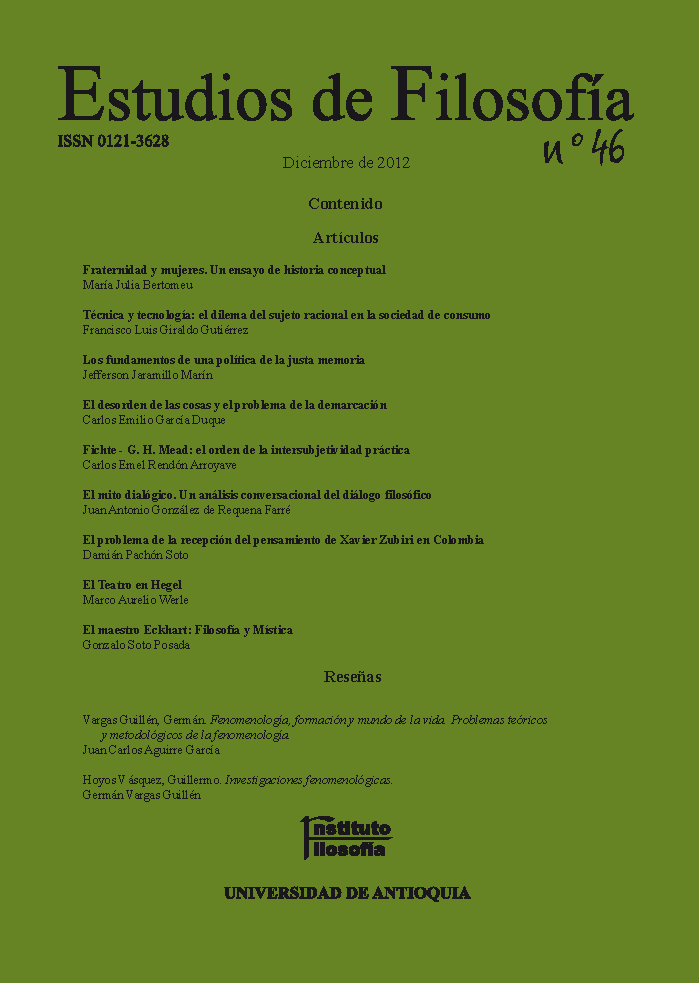Technique and technology: the dilemma of the rational subject in a consumer society
DOI:
https://doi.org/10.17533/udea.ef.14758Keywords:
Reason, Subject, Consumer, Rationality, Technical, Technology, Society.Abstract
Today we operate in a rapidly changing world replete with scientific, technical and technological developments. A world conditioned by the interests of economic globalization, where the imperative is to consume, and where those who produce individually and differently are absorbed, in the best of cases, or made obsolete by the capitalist system. Now, this state of affairs has set at risk the loss of the rational subject inherited from and characterized by Modernity, a loss which is required today to create the Subject of Technological Rationality. The subject-person-rational agent is at the crossroads in the consumer society and an economic system of production. The question is whether to continue to permit ourselves to be considered and utilized as objects, things, tools, and artifacts, even more within the Artefactual system, or to recover the ability of rationality, inherited from Modernity and which was endorsed as Technological Rationality since the Industrial Revolution.
Downloads
References
DESCARTES, R. (2010) Meditaciones metafísicas, España, Escuela de Filosofía Universidad de ARCIS. Disponible en: www.philosophia.org Recuperado el 13 de julio de 2010.
DESCARTES, R. (1983) Discurso del método. Reglas para la dirección de la mente, Barcelona, Orbis.
ECHEVERRÍA, J. (2003) La revolución tecnocientífica, México, Fondo de Cultura Económica.
GARCÍA, D.E. (2007) “Filosofía y cultura”, en: J.A. Sánchez, Filosofía actual en prespectiva latinoamericana, Bogotá, Universidad Pedagógica Nacional, pp. 211-251.
HEIDEGGER, M. (1995) “La época de la imagen del mundo”, en: Heidegger M., Caminos de bosque, Madrid, Alianza Editorial, pp. 75-109.
HEIDEGGER, M. (1993) La pregunta por la técnica, Madrid, Alianza Editorial.
LIPOVETSKY, G. (2002) La era del vacío, Barcelona, Anagrama.
QUALTER, T.H. (1994) Publicidad y democracia en la sociedad de masas, Barcelona, Paidós.
QUINTANILLA, M. (2005) Tecnología: un enfoque filosófico y otros ensayos de filosofía de la tecnología, México, Fondo de Cultura Económica.
ROJO, F. (2009) La obra de arte como fetiche contemporáneo, Medellín, Fondo Editorial ITM.
Downloads
Published
How to Cite
Issue
Section
Categories
License
Copyright (c) 2012 Francisco Luis Giraldo Gutiérrez

This work is licensed under a Creative Commons Attribution-NonCommercial-ShareAlike 4.0 International License.
Authors who publish with this journal agree to the following terms:
1. The Author retains copyright in the Work, where the term "Work" shall include all digital objects that may result in subsequent electronic publication or distribution.
2. Upon acceptance of the Work, the author shall grant to the Publisher the right of first publication of the Work.
3. The Author shall grant to the Publisher a nonexclusive perpetual right and license to publish, archive, and make accessible the Work in whole or in part in all forms of media now or hereafter known under a Creative Commons Attribution-NoCommercia-ShareAlike (CC BY-NC-SA 4.0), or its equivalent, which, for the avoidance of doubt, allows others to copy, distribute, and transmit the Work under the following conditions: (a) Attribution: Other users must attribute the Work in the manner specified by the author as indicated on the journal Web site;(b) Noncommercial: Other users (including Publisher) may not use this Work for commercial purposes;
4. The Author is able to enter into separate, additional contractual arrangements for the nonexclusive distribution of the journal's published version of the Work (e.g., post it to an institutional repository or publish it in a book), as long as there is provided in the document an acknowledgement of its initial publication in this journal;
5. Authors are permitted, and Estudios de Filosofía promotes, to post online the preprint manuscript of the Work in institutional repositories or on their Websites prior to and during the submission process, as it can lead to productive exchanges, as well as earlier and greater citation of published work (see The Effect of Open Access). Any such posting made before acceptance and publication of the Work is expected be updated upon publication to include a reference to the Estudios de Filosofía's assigned URL to the Article and its final published version in Estudios de Filosofía.















